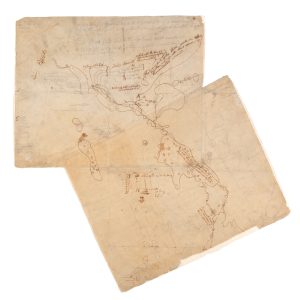
People & Culture
Kahkiihtwaam ee-pee-kiiweehtataahk: Bringing it back home again
The story of how a critically endangered Indigenous language can be saved
- 6310 words
- 26 minutes
People & Culture

General Edmund Allenby’s arrival at Damascus in 1918 had preceded Emir Faisal’s own by a few hours and was done conventionally in an open-top Rolls Royce and with little fanfare. His entrance into Jerusalem, by contrast, by walking through the Jaffa Gate had been of greater moment, although then as now he continued to eschew the traditional conqueror’s trope of sitting astride a horse.
That Faisal, leader of the Arab Army that was part of the Middle East theatre of the First World War, would choose to do so, however, was understandable to Allenby and he did not see it as being in any way comparable to the Kaiser’s unwarranted entry into Jerusalem in 1898 or, for that matter, a similar visit to Damascus that he had made later the same year. The Hotel Victoria, where Allenby had summoned Faisal to meet him, was a much smaller and less grand version of Cairo’s Shepheard’s Hotel, but traditionally it had been at the heart of Damascene political life.
The meeting between Allenby and Faisal, which would be their first ever, was pregnant with both importance and symbolism. A number of others would be present at their encounter, including Lieutenant Colonel T.E. Lawrence (Lawrence of Arabia) and Lieutenant General Harry Chauvel. Lawrence would act as interpreter, but by this point his psychic dissonance had returned in a pronounced way and he had resolved already to quit the deserts of the Middle East and head for home. He did not keep detailed notes of the meeting, writing later mainly of the two principals and how they made “a strange contrast: Feisal, large-eyed, colourless and worn, like a fine dagger; Allenby, gigantic and red and merry, fit representative of the Power which had thrown a girdle of humour and strong dealing round the world.”
As requested by Allenby, Faisal hurried to the centre of Damascus and at 2:30 that afternoon the two men began what would turn out to be not much more than a half-hour meeting between them. Allenby led off by voicing his immediate approval of what Lawrence had established by way of an Arab civic administration over the previous two days of tumult, and confirmed that the respected Syrian political leader, Ali Riza Rikabi, would take over as military governor from what had proven already to be a too-burdensome task for the over-matched Shukri. But these were mere preliminaries leading up to the heart of the encounter, which was to make clear the scope and content of putative Arab sovereignty over the territory from which the Ottomans had just been expelled so decisively, with the final act of their complete expulsion from the Middle East yet to come.
The only thorough recounting of the historic meeting between Allenby and Faisal on Oct. 3, 1918, is that made by Chauvel, who kept shorthand notes of it. Eventually, 11 years later in 1929, he would turn these notes into a three-page document. Both the passage of time in writing it, and the less-than-verbatim notetaking of a 30-minute meeting held many years earlier, may have rendered Chauvel’s account not wholly reliable; still, his report remains the only full reprise of the Allenby-Faisal encounter, one that would leave Faisal shaken and disappointed, and confirm Lawrence’s departure for England as soon as possible followed by his taking up of the Arab cause at Westminster.
Just prior to meeting with Faisal, Allenby had been given updated instructions by London, which essentially ordered him to implement the provisions of the Sykes-Picot Agreement. The British government considered both the agreement, as well as the Balfour Declaration, to be operative, meaning that a form of Arab control under French influence would prevail henceforth in the northern ‘A’ zone, as configured by Sykes-Picot, while the same kind of arrangement but under British influence would exist in the southern ‘B’ zone. Palestine — to which the Balfour Declaration applied — would exist outside of the Arab sphere altogether, as would Lebanon.
Allenby, in informing Faisal of these conditions, told him also that he would be obliged to accept the presence of a French liaison officer who, for the time being at least, would work with Lawrence. It might well be assumed that little of what transpired between Allenby and Faisal is what the Arab leader wished to hear however, and therefore, according to Chauvel, to all of these provisions “Feisal objected very strongly.”
Meanwhile, Lawrence, who was participating in these brief proceedings with a growing sense of discomfort, then was asked directly by Allenby: “But did you not tell him that the French were to have the Protectorate over Syria?” Lawrence replied, according to Chauvel, “No Sir, I know nothing about it.” In responding in this way to Allenby, Lawrence clearly was being disingenuous for both he and Faisal were well aware of the Anglo-French agreement which, by then, had been in the public domain for many months. Not only that, but as we have seen, Lawrence had met with Mark Sykes in person at Wajh in the previous year.
As a consequence, however, the atmosphere in the meeting room at the hotel turned testy very quickly. But Allenby, not about to be challenged in this regard, told Faisal firmly that “he must accept the situation as it was and that the whole matter would be settled at the conclusion of the War.” Being under Allenby’s command, Faisal could do little other than to obey. Greatly dismayed with what he had been told, however, Faisal then left the hotel resignedly, observed Chauvel, “with his entourage (less Lawrence) and went out of the City again to take on his triumphal entry.”
At this point in the afternoon’s proceedings, a visibly upset Lawrence told Allenby that he would refuse to work with a French liaison officer to advise Faisal, and since he was due for leave he would like to take it now and depart for England immediately. In response, Allenby offered Lawrence a cryptic, “Yes! I think you had,” and the meeting came to an end frostily. Chauvel’s words bristle with evidence of tension between Allenby and Lawrence at the conclusion of this historic meeting, although it is worth noting that in neither man’s account of the same event do they even hint at the existence of strife between them, much less offer an elaboration of a rift having occurred.
But Lawrence remained determined to go home all the same, which he began to do the very next day by driving in Blue Mist en route first for Egypt, and then later taking ship for England. During his short stopover in Cairo he gave Mabel a special Baluchi carpet, which would become for her a prized possession and about which Allenby would remind Lawrence of its “romantic” provenance almost 10 years later at the time of the publication of Seven Pillars of Wisdom. From Cairo, just before departing for London, Lawrence would write elegiacally to the British base commandant at Aqaba: “The old war is closing, and my use is gone. We were an odd little set, and we have, I expect, changed History in the East. I wonder how the Powers will let the Arabs get on.”
Meanwhile, Allenby, as planned, had left Damascus immediately after the meeting and was soon back at his GHQ at Bir Salem, writing to Mabel of having met with Faisal, “a fine, slim sharp featured man” with whom he had had what was described as a “satisfactory talk.”
For Allenby, the war was effectively over too, although the final pursuit of the remnant Turks who remained in the field meant that an Anglo-Arab force ran them to ground at the key northern Syrian city of Aleppo on October 26. On that day, the city fell after a spirited fight between two evenly matched contingents of about 3,000 men each. Five days later, and less than two weeks before a general armistice would be declared on the Western Front, the Armistice of Mudros was signed by the Ottomans and the British at the eponymously-named harbour on the Greek island of Lemnos.
What Allenby’s EEF and Faisal’s Arabs had wrought together on the field of battle across much of the Middle East during the previous year and a half — “a glorious and memorable achievement,” as King George put it in a congratulatory message to Allenby — would be turned over now to the peacemakers at Paris, who would congregate there to begin their deliberations in just a little over two months’ time. A supremely militarily victorious Allenby was set fair now to depart the battlefields of the Middle East for its halls of political power, a change, as we shall see, that would come to dominate the next seven years of his life.
Are you passionate about Canadian geography?
You can support Canadian Geographic in 3 ways:

People & Culture
The story of how a critically endangered Indigenous language can be saved

Places
In Banff National Park, Alberta, as in protected areas across the country, managers find it difficult to balance the desire of people to experience wilderness with an imperative to conserve it

People & Culture
*It means “awake” in Beothuk, the language and people who once called present-day Newfoundland home for about 2,000 years. One young woman, believed to be the last living Beothuk, left a collection of maps and art that help us understand her people’s story.

Environment
Struggle and success in Atlantic Canada, where aquaculturists strive to overcome climate change and contamination while chasing a sustainable carbon footprint